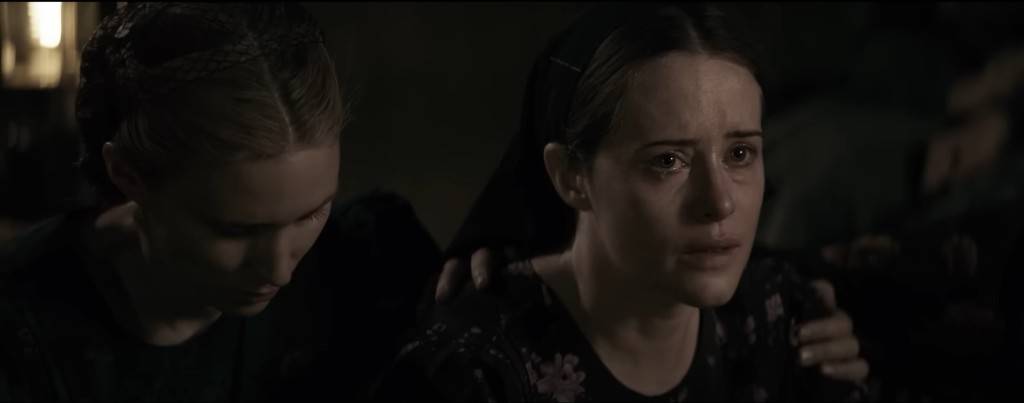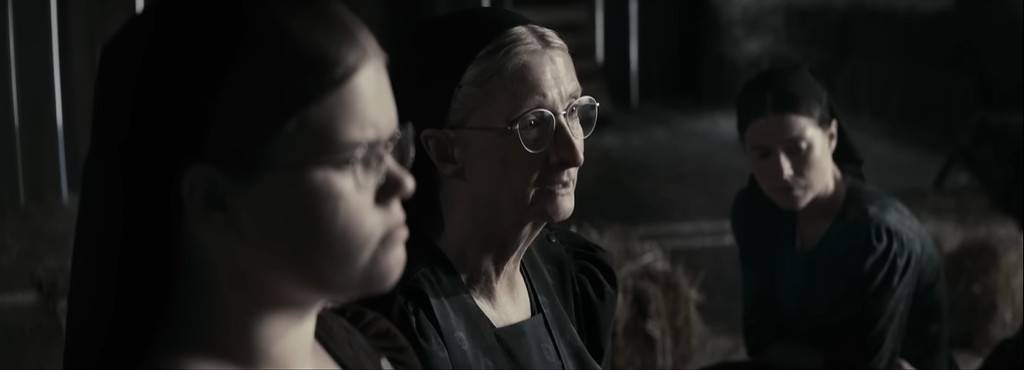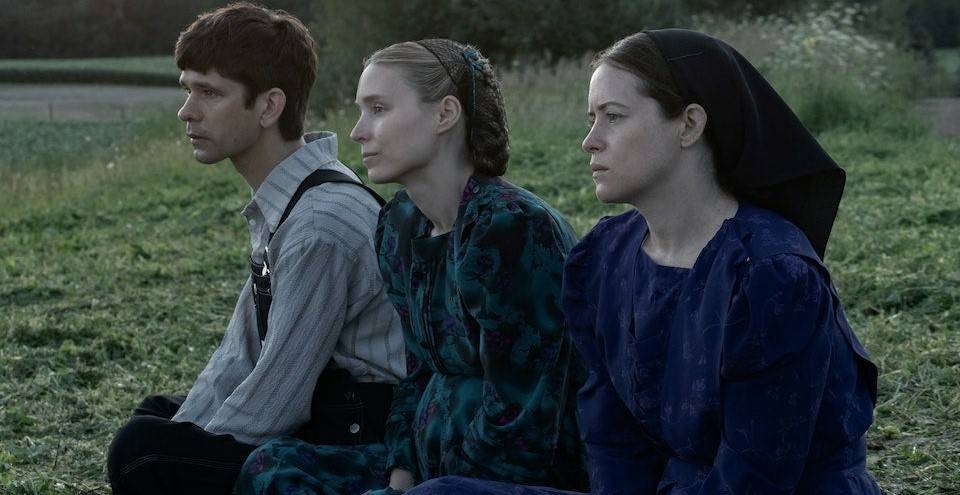The Oscar-nominated 2022 movie “Women Talking,” by Sarah Polley, is a very thought-provoking tale that examines the ideas of oppression and trauma in an effort to present them in all of their complexities and interpretations. It tells the tale of a group of women who reside in a remote religious colony and how their lives are turned upside down when they discover that they have been subjected to long-term abuse at the hands of the colony’s men.
Given its delicate subject matter, the movie is appropriately melancholy in atmosphere and dialogue-heavy, with the whole plot centred on thoughts and ideas. It is suggested that these women engage in a 24-hour discourse with one another and with themselves as they look for a way to get past their resentment, grief, and fear. By the time the story is over, viewers may still be left with some unanswered questions due to the story’s abundance of emotionally taxing moments and difficult viewpoints. Here are some of them in more detail. Spoilers follow.
Women Talking Plot Synopsis
The shocking revelation of the ongoing sexual mistreatment of women in a remote colony opens the film. The women learn that the episodes that had previously been dismissed as the result of feminine hysteria and imagination were actually true rape and drug crimes committed by men against the women and girls in their community over a long period of time.
Once the attackers are identified, they are detained and transferred to a nearby city where they will be imprisoned. After to save the assailants, the colony’s males depart, leaving the women to fend by themselves for two days. The women decide to cast a vote on their future plans after being left alone for the first time. They are still reeling from the impact of the recent disclosures. They offer three distinct and distinct options: stay, go, or stay and fight.
Following this lengthy and contrasted dialogue, which forces women who were previously forbidden from even thinking to envision a future for themselves and their children, the rest of the story is set. The cast of characters all have distinctive viewpoints that are shaped by trauma reactions that all result from the same traumatic circumstances but have had varying effects on each character’s identity and beliefs.
Each character discovers the space to realise themselves and work through their traumas in an open and honest dialogue, and in the end they reach a conclusion. They choose to go.
Women Talking Ending: Why Did The Women Leave?
One of the main characters, Salome, finds it impossible to even consider leaving at the beginning of the film. Salome believes that leaving is a sign of fear and capitulation. She feels betrayed by the abuse of her 4-year-old daughter and seeks retribution.
Another protagonist, Mejal, is likewise seen to be opposed to leaving. The colony’s women are all illiterate, have never been informed of the world outside of their small group, and have been subjected to a repressive system and orthodox, oppressive ideas their whole lives. The only system they have ever known, though, is this one. Leaving wouldn’t be anything more than picking one type of risk over another? How could they possibly find security in a foreign environment?
Both the audience and the women now appear to have made their decision. The colony is equally the property of the women and the men, and neither group should be forced to pay for the repercussions of the other. They’ll remain, they’ll fight for a better future. The concept only begins to fall apart when the how is brought up. How can you address a violent and hateful issue without engaging in violence and hatred yourself? How can these women demand the right to their life back in a society that has been founded on decades of misogyny and inhumane persecution without the struggle slowly eating away at their souls?
Whether they were indoctrinated or not, they practise pacifism. Although the foundations of who they are are peace and forgiveness, their current circumstances make it unrealistic for either to exist. Remaining and fighting is not an option since it would place them on a path where violence would either be inflicted upon them or directed at them. Therefore, giving up without a fight was never an option.
The women are ultimately forced to leave in order to protect not only their security but also their sense of identity and faith. It is now an act of self-preservation in the face of difficulty rather than one born of submission or cowardice.
Why Does August Stay Behind?
Only Melvin and August remain after all the males have left. The only person in the colony with outside-world experience is August, who teaches the lads. His outlook and values are different from those of the other guys in the colony and heavily affected by his mother. In a nutshell, he is the example of a man who is not typical of males. It’s crucial to comprehend why August returned to the colony in the first place if you want to comprehend why he stays behind.
August is assigned the role of the spectator at the beginning of the film. He is just as much a spectator of the plot as the audience, but as it develops, he is given more and more freedom. As we discover more about him and his life, we begin to see how much of his behaviour is motivated by his love for the two women in it—his mother and Ona. The same love that drives him to feel responsible for imparting a better, more compassionate way of living to the next generation of men.
Although his mother was rejected by their neighbourhood, August went on to lead a regular life and even enrol in college. August chooses to reside in the colony, in contrast to the women in this tale. He makes this decision because he is unable to ignore the current circumstance. August feels involved in these women’s abuse, much like a passive witness to a crime in progress. He cannot depart from the colony in good conscience without making an effort to improve conditions.
His persona serves as a deliberate representation of the part men play in the struggle against prejudice against women. Men’s contributions to the struggle and their unity are crucial and required. The contribution a man may make to growth in a society where males hold all the power and women none is unmatched. And so August decides to stay behind, despite the fact that doing so would require him to say goodbye to the lady he loves. He decides to stay behind since he owes it to Ona and his mother to at least attempt and effect change in the current generation of males.
Who is The Narrator?
A female narrator opens the movie with a monologue-like opening, and this technique is used throughout the rest of the story. Thus it only makes sense to ask, “Who is the narrator?”
The film “Talking Women (2022)” is based on Miriam Towes’ book of the same name. August narrates the story’s events in the novel, but it is abundantly evident that this is not the case in the movie. Instead of August, Autje, Mariche’s daughter, serves as the narrator in the movie.
The choice to have a young girl rather than a male relate the tale of these women fits with the overall concept of the film. After all, the narrative centres on a situation that is unique to those who are born as girls. Autje is shown throughout the film as being intrigued about the world outside of the colony and as seeing the chance to escape as thrilling and advantageous.
The novel brilliantly uses the cult-like colony as a simple metaphor to reflect and remark on our contemporary culture. It is able to achieve this by distancing itself from the nuances of our society and presenting these social issues, such as the physical autonomy, sexual exploitation, and intellectual enslavement of women in a setting that is inherently patriarchal, in their most basic forms.
Like all of the colony’s ladies (as well as Melvin), Autje has a thorough understanding of these concepts. She is still young enough to get over her conservative upbringing, but still wounded enough to realise its significance.
This film recounts a very particular tale about a very particular problem that affects the lives of many people. What follows is an act of feminine imagination, is written on the screen at the very beginning of the film. The situation in this narrative is an analogy for one that exists in the actual world, albeit it doesn’t simply affect one orthodox colony in the real world. Because there is nowhere to run to in the actual world, there is no simple way out. regardless of how strongly the female psyche might want for it.
This movie deals with a sensitive subject, but it does so delicately and without making it seem insignificant. Although this issue occurs frequently in our culture, it is given space in this one-hour, 45-minute film for depth, analysis, and—perhaps most significantly—a chance for understanding.



